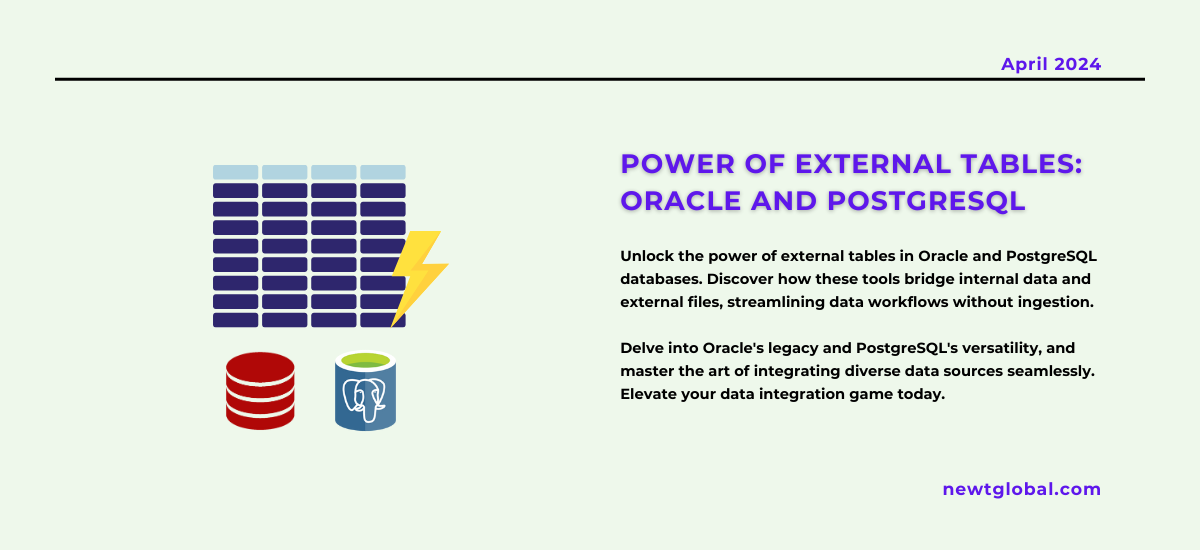
In the world of managing databases, there’s a cool tool called external tables that lets us use data stored outside the database just like we use the data inside it. This is super useful because it makes working with data from different places much easier. Let’s take a closer look at how Oracle and PostgreSQL use external tables differently.
What Are External Tables?
Think of external tables as a magic bridge that lets you run SQL commands on files stored outside your database as if they were inside it. These files can be on the same computer as the database or somewhere on the internet. This means you can work with this data directly without having to first put it into your database, making your life a lot easier.
Oracle’s Way of Using External Tables
Oracle introduced external tables with Oracle9i. These tables allow you to access data from outside sources just like you would with data stored directly in Oracle’s database. Initially, you could only read data from external tables, but newer versions now let you write to them as well.
Key Features:
-
- Direct Data Access: You can interact with external data files using SQL without needing to import them into Oracle.
- Various Formats: External tables support different file types like CSV and text files.
- Location Flexibility: Data can be stored on a physical disk or accessed through Oracle Directory connectivity.
PostgreSQL’s Take on External Tables
PostgreSQL introduced External Tables through Foreign Data Wrappers (FDWs) in version 9.1. This feature allows PostgreSQL to talk to other databases, web services, and data files seamlessly, making it a versatile tool for integrating various data sources.
Main Features:
-
- Foreign Data Wrappers: A system that helps PostgreSQL connect to external data sources.
- Wide Data Source Support: PostgreSQL can query databases, web services, and files using FDWs.
- Read and Write Operations: The capabilities depend on the chosen FDW.
Differences Between Oracle and PostgreSQL
While both Oracle and PostgreSQL aim to make it easy to work with external data, they have different approaches:
Methodology:
-
- Oracle focuses on working specifically with files.
- PostgreSQL uses FDWs to create a unified way to interact with many types of external sources.
Functionality:
-
- Oracle started with read-only capabilities but now supports writing to external tables.
- PostgreSQL’s FDWs can handle both reading and writing, depending on the FDW used.
Data Sources:
-
- Oracle mainly deals with file-based data for external tables.
- PostgreSQL, through FDWs, can connect to a wider range of sources like different databases and web services.
Setting Up and Using External Tables
Setting up external tables in Oracle requires more knowledge about database structures and access rights.
In PostgreSQL, using FDWs makes it easier to connect to various data sources, although you might need extra tools or extensions.
Making the Most of External Tables
External tables are powerful tools for integrating external data into databases. Understanding how Oracle and PostgreSQL handle them differently can help database managers and developers use these features effectively in their projects.
So, whether you’re working with Oracle’s robust system or leveraging PostgreSQL’s versatile FDWs, you can enhance your data management strategy by mastering external tables.
Ready to revolutionize your data integration with Oracle and PostgreSQL?
Dive deep into the world of external tables and transform how you interact with external data sources. Whether you’re exploring Oracle’s robust framework or leveraging PostgreSQL’s versatile Foreign Data Wrappers, the ability to seamlessly query and integrate external data into your relational database workflows is within reach.
Unlock the full potential of your data management strategy by understanding the nuanced differences and strengths of Oracle and PostgreSQL external tables. Elevate your data integration capabilities now with Newt Global.
Discover a wealth of resources and expert guidance at newtglobal.com. For personalized assistance in harnessing the power of external tables in your database environment, connect with our specialists at marketing@newtglobalcorp.com.
Embark on your journey to seamless data integration today. Newt Global DMAP is a world-class product enabling mass migration of Oracle Db to cloud-native PostgreSQL faster, better, and cheaper.
